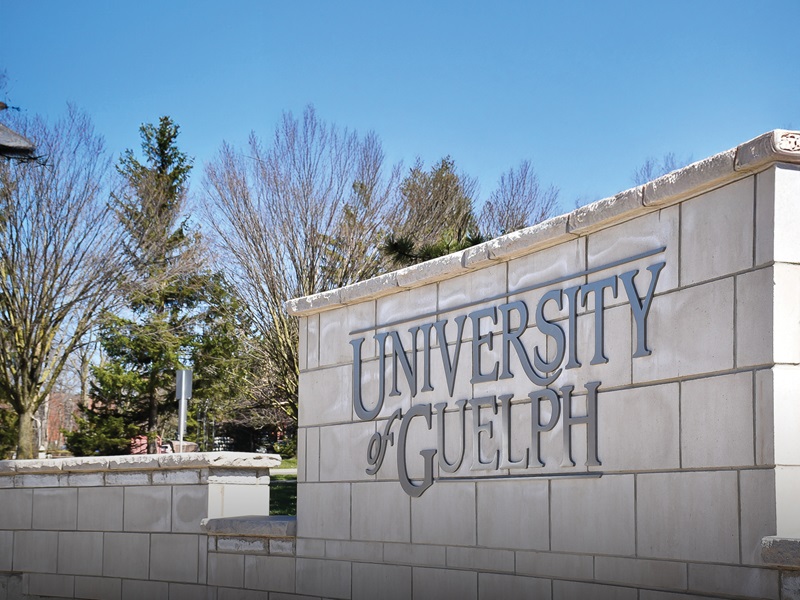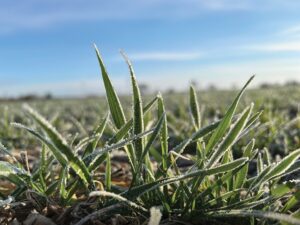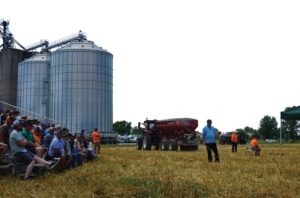From Burford to top brass
Canada’s leading agri-food university picks an Aggie president

Leading institutions choose the right leader for the right job at the right time…which makes the appointment of Dr. Rene Van Acker, the agriculturally oriented new president of the University of Guelph, a telling and important choice.
Van Acker, who was raised on a tobacco farm near Burford, Ontario, was appointed to the university’s top post on July 2, 2025. He’s the first University of Guelph alum to be named president of the institution, and the second Aggie. Dr. Burt Matthews, who served as president from 1983 to 1988, graduated from the Ontario Agricultural College (OAC) in 1947, before the university became a degree-granting institution in 1964.
Between Matthews and Van Acker, University of Guelph presidents ranged from neuroscientists to Chinese scholars to publishing executives. Most of them knew little about agriculture. But with faculty, staff, and students behind them, they connected with the agri-food sector, shared a vision, and helped the university become Canada’s leading agri-food institution and a global leader in innovation.
Van Acker’s appointment takes that connectivity a step further, at a time when geopolitics and other weighty factors are challenging society’s very fundamentals, such as agriculture and food production. There’s now a solid line that unites the University of Guelph’s president’s office and the farm community—with which Van Acker’s grassroots upbringing, along with his strong academic foundation in agriculture, has struck a resounding chord.
“We’ve worked closely with Dr. Van Acker throughout his career to build research capacity relevant to grain farmers,” says Grain Farmers of Ontario CEO Crosby Devitt (OAC ’97). “His practical approach to partnerships with farmers made it easy to see tangible progress. We are excited to see Dr. Van Acker take on the president’s role and bring his strong vision to the entire University.”
Stephanie Rempel, general manager of Wallenstein Feed and Supply, noted her company has collaborated with Van Acker on several key initiatives.
“We’ve admired his dedication to advancing Ontario’s agriculture industry,” she says. “With a shared vision for supporting farmers and strengthening the industry, we look forward to his continued leadership and his lasting impact on the future of agriculture.”
Adds Len Kahn (OAC ’85), chief marketing officer for Kitchener-based agricultural technology company BinSentry: “Having a leader at the University of Guelph who not only deeply understands the value of agricultural technology but has consistently demonstrated that understanding through meaningful partnerships with both the university and industry, is an incredible asset. Dr. Van Acker’s proven ability to bridge research, innovation, and practical application ensures that the University of Guelph will continue to drive forward-thinking solutions that strengthen agriculture in Canada and beyond.”
STUDENT TO LEADER
The new president is a career academic. After graduating from OAC with a Bachelor of Science in 1990, he then earned his Master’s degree at Guelph and PhD at the University of
Reading in the UK. He became an assistant plant science professor at the University of Manitoba in 1996. He returned to Guelph as chair of the Department of Plant Agriculture, then moved to Johnston Hall, the administrative home of OAC, in 2009 as associate dean, external. In 2016, he was appointed OAC dean, followed by vice-president of Research and Innovation in 2024. He served as interim president after then-president Charlotte Yates departed last year, before being appointed to the presidency in the summer.
Van Acker is part of a first-generation Canadian farm family, one of three children born to Belgian immigrants who arrived in Canada in 1958 and began farming. He says that upbringing—including working in tobacco, arguably one of the most physically demanding jobs in agriculture—brought with it many lessons.
“Growing up on a farm, with parents who were hard-working new Canadians, I learned how to work and how to see work that needed doing,” he says. “That has served me very well in my career. I also learned to appreciate how susceptible farming is to weather and to value good weather.”
MOVING THE AGRICULTURE SECTOR FORWARD
Van Acker acknowledges that certain aspects of the agri-food sector require attention. In an opinion piece in the Globe and Mail newspaper last October, authored with professors Evan Fraser and Lenore Newman, Van Acker outlined some of the sector’s ills. “We have a regulatory system that is hard to navigate, there is a lack of capital available to agriculture and food entrepreneurs, and we face chronic labour shortages that throttle innovation. This is especially galling, given that we are great as a nation at creating intellectual property and starting companies.”
At the time, Van Acker and his colleagues said they wanted higher education to get more engaged, as a remedy to some of these ills. “Crucially, our universities and colleges need the opportunity to do more,” they wrote. “We need to redouble our efforts to encourage young innovators to apply their ingenuity to sustainable food production and food security. And Canada’s research councils need to create funding opportunities so that established researchers working in disciplines such as robotics, genomics, and artificial intelligence are given opportunities to apply these tools to making Canada’s food system more efficient, healthy and sustainable.”
That advice was visionary. A study by a research team at Toronto’s Leaders Fund, released in September, shows just over 32 per cent of high-potential startups launched last year that were led by Canadian teams were actually based in Canada. That was down from more than 67 per cent in the late 2010s. Most of these start-ups involved Canadians who had moved to the U.S.
INNOVATION PRIORITIES
But times have changed, even in the past 12 months. Working in the U.S. is more challenging than ever. Canadian nationalism is an element of almost every new innovation initiative. And from the president’s chair, Van Acker is poised to rally the resources of the entire university towards increased innovation.
He’s encouraged by existing initiatives at the university, such as the Feeding the Future exercise, in which university officials engage with stakeholders to determine priorities. During the latest iteration of this program, which involved
more than 300 stakeholders, including Grain Farmers of Ontario, participants suggested that the university’s strong track record in commercialization should be expanded, particularly for small and medium-sized enterprises in the agri-food sector, including farms. Mentorship, funding, and clearer pathways for taking innovations from the lab to the marketplace were among the activities cited for more support.
The Ontario government has played a huge role in Guelph’s agri-food research success. In his role as OAC dean and research vice-president, Van Acker has worked closely with the province to maximize the Ontario Agri- Food Innovation Alliance, which is credited with having a $1.44 billion impact on the province’s GDP. This collaboration is unique in Canada, bringing together the University of Guelph, the Ontario Ministry of Agriculture, Food and Agribusiness and Agricultural Research and Innovation Ontario. Van Acker is enthusiastic about the alliance being key to Guelph increasing its role as an agricultural technology hub, and its potential for entrepreneurship centred around the alliance’s network of 13 publicly owned agricultural research stations, sites, and investments across the province.
Grain Farmers of Ontario and other commodity groups have made significant contributions to the University’s drive towards innovation. Over the past 10 years, Grain Farmers of Ontario has invested over $8.8 million in 76 research projects led by University of Guelph faculty. The total value of the projects is over $30 million. Grain Farmers of Ontario also invested in two professorships, for field crop pathology ($2 million) and for wheat breeding ($500,000, with matching support from SeCan). Devitt says this support provided the university with cost certainty to hire professors in field crop entomology and weed science. Grain Farmers of Ontario also contributed $30,000 to the University of Guelph, Ridgetown Campus’ Agri-Food Entrance Scholarship Program.
CHALLENGES AND OPPORTUNITIES
One of Van Acker’s day-to-day challenges will be managing expectations about his devotion to the agri-food sector. Although he’s an Aggie at heart, he’s responsible for all eight of the university’s colleges, three campuses, 29,000-plus students, 3,100 administrative staff, and 830 academic staff. That’s a tremendous undertaking. But as Van Acker points out, no matter what classroom or lab you enter at Guelph, agri-food is rarely absent. It runs the gamut, including social science, environmental science, veterinary medicine, engineering, and more. Says artificial intelligence expert Dr. Rozita Dara, who came from Blackberry to join the Department of Computer Science: “When I joined the university, I couldn’t help but work on agriculture. It’s everywhere here.”
Van Acker has huge issues on his plate that dog other university presidents, too, such as the province’s tuition freeze and Ottawa’s decision to limit international student enrolment. Both measures have “knocked the stuffing out of university budgets,” says Van Acker, and they require constant attention and lobbying from academic leaders like him.
But they haven’t dampened his enthusiasm for the job, or for his zeal to promote the agri-food sector broadly. At this year’s Canadian Outdoor Farm Show, Van Acker spent two full days onsite—about 75 per cent more time than previous presidents— rubbing shoulders with producers and others he’s connected with. After that, he dedicated another day to participating in the International Plowing Match in Grassie, Ontario.
“Being at these events was a great reminder that people are at the heart of Ontario’s agri-food sector,” says Van Acker. “Agri-food is number one in Ontario, and at the University of Guelph, we’re proud to help train the next generation of leaders ready to carry that future forward.” •



























